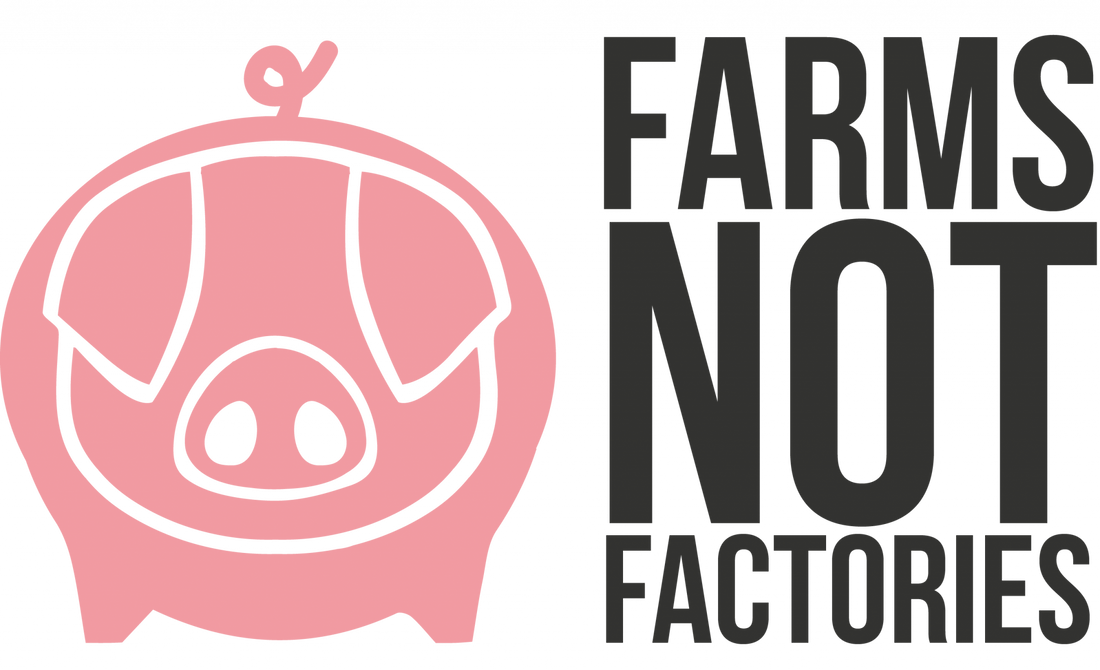
In Conversation with… Tracy Worcester from Farms Not Factories
Farms Not Factories founded by Tracy Worcester is the campaign to end factory farming. We caught up with Tracy to learn more about the campaign, and how consumers purchasing higher quality meat can make a huge impact.
Can you give us a brief overview of the organisation and how it was started?
Farms not Factories campaigns to expose the true costs of factory farming on animals, people and the planet by exposing the flaws in the global food economy and urging shoppers to only buy meat from a high welfare farm as these are small or medium scale independent farms.
To cover the extra cost, we suggest eating less but better meat; this will help avoid obesity-related illnesses like diabetes, heart disease and cancer. We largely work with video and started with the 70-minute film Pig Business which was shown on Channel 4, More4, was translated into 21 languages, shown in the House of Commons, EU parliament and Capitol Hill, Washington. We then made 7 country specific versions as people across the world contacted us to help them prevent the building, or to help close an operating factory pig farm. At the end of each film, we urge viewers to shop responsibly, sourcing meat from high welfare farms and local markets.
Why is it so important to move away from cheaply produced pork in factory farms?
Sadly, pigs in factory farms do not live in the best conditions and aren’t able to roam freely as they typically would on a smaller farm. Often, they live in an overcrowded pen, unable to breathe fresh air. These poor living conditions can cause disease to spread rapidly. In the UK, 50% of all antibiotics are sold to treat livestock; mostly to pigs and poultry so that they can stay alive in such conditions. This can lead to AB resistant diseases that pass to humans such as e.coli, salmonella, campylobacter and MRSA.
In an investigation carried out by the Soil Association, 63% of pork samples had antibiotic-resistant e.Coli, which is the most common cause of urinary-tract infections, dangerous blood poisoning, and can also cause meningitis.
Typically, on small, outdoor farms, pig waste is utilised as a useful fertilizer. However, pig waste from larger factories is disposed of in such large quantities that it becomes a pollutant, poisoning local air, soil, flora and fauna, streams and on to the rivers and seas.
Is the pork generally found in supermarkets produced in factory farms?
75% of pork sold in the UK comes from pigs reared in factory farms, 60% of which is imported from factory farms, mostly in Europe.
What is food sovereignty? How can we achieve it?
Food sovereignty is when a family, a community, a region or a country supplies its own food and so it is resilient to shocks, not least Covid and climate change.
Though hanging on against all odds, according to the UN, 70% of the world is still fed from small scale farmers who retain the knowledge of both growing food and community building homes with local infrastructure, while enhancing nature and of course free of debt. We need to increase and protect the remaining precious network of small-scale producers, slaughterhouses, processors, shops and markets.
The few that survive in the UK have flourished during lockdown as people realise the value of knowing where their food has come from and how it was made. As a direct consequence of Covid, statistically 86% of the UK citizens agree that British farms should grow enough to provide national food security – long may the awakening last on how important it is to protect our food source for the common good.

How can consumers shop for pork more responsibly?
If you want to avoid factory farmed pork, look for the labels RSPCA Assured, Free Range and best of all Organic. Better still is to buy high welfare but avoid the supermarket and only buy from farmers’ markets, online, box scheme or Community Supported Agriculture Scheme.
Where can we learn more about this issue?
Visit our Farms not Factories website, or Compassion in World Farming, The Soil Association, The Sustainable Food Trust, SUSTAIN or The Landworkers Alliance.
What projects are you currently working on?
Presently we are writing weekly newsletter to keep our followers up to date on the progress of the Agriculture Bill and the Trade Bill as they pass through the various stages in the House of Commons and Lords before they become law.
Public opinion on the importance of farming is at an all-time high; 86% agreed that British farms should grow as much food as they can to provide national food security.
How has COVID 19 impacted your campaign?
We have continued our campaigning work, but on slightly different projects. We have not been able to add to our ‘Rooting for Real Farms’ video series about high profile chefs and the high animal welfare pig farmers that supply them with pork. Nor have we been able to film interviews with pioneers in the procurement industries who are sourcing local high welfare pork. Instead we have been asking small scale pig farmers to film themselves explaining how their businesses are faring during Covid, and how they have adapted their sales strategies. Thankfully most are doing well as the lockdown has meant that more people are shopping locally from farmers they trust.
We are also now working from our homes in various different locations in the UK and loving it, so will remain a remote office for the foreseeable future.
You can show your support for Farms Not Factories by following them on social media, signing up to their database and donating on their website farmsnotfactories.org. They are a not-for-profit organisation.
